Tuesday, May 30, 2006
Sporadic blogging ahead
From there we go on to Jordan and Syria on a delegation of peace activists organized through Global Exchange and United for Peace and Justice. On this part of the trip we will visit Wihdat and Al-Baqa'a camps, long home to displaced Palestinians, now crowded with Iraqi refugees as well. We will meet with the founding member of Act Together: Women's Action on Iraq. We will meet with UNESCO-Iraq. We will meet with an Iraqi civil engineer and blogger whose son was kidnapped in Iraq and we will meet with an Iraqi professor to discuss the situation of academics in Iraq.
The delegation will make a brief visit to Damascus, Syria, to meet with a group of Christian Iraqis and other others affected by U.S. incursions into their countries.
All in all, lots of meetings. The apprehension I feel arises in part simply from going to an unknown place with an unknown language. But more deeply, it arises from fear and hope about whether our making these visits can be made useful in the long, laborious, political process of turning our country away from projecting military might and toward a sustainable future. Why put these people, their lives already torn apart by my government's mad adventure, through telling their stories to a small bunch of powerless U.S. peace folks?
We won't know if this trip can be justified until we've been on it -- and returned to share whatever we can of what we've seen and heard. I do know -- from a decade of work in solidarity with people in Central America when they were under direct attack by the U.S. -- that both they and we were changed and deepened through the connections we made.
The U.S. seems to have pushed Iraq over a precipice into a multi-directional war of all against all -- a war in which I am sure most people are simply trying to keep their vulnerable heads down. From what I read this morning Afghanistan seems to be going the same way.
People in the United States working to end our wars face the paradox that the Iraq war has fallen out of favor with the country, but the peace movement has not won the political clout to expedite its end. But we must try. So we go on trips, and talk with people, and march, and educate, and organize, and pray -- for not to act would be to diminish our own humanity. We will strive to make some good come of this trip; I will report further, when I can get online.
Monday, May 29, 2006
Torture is wrong

Banner in Austin, Texas
In the middle of June, the Episcopal Church of the USA (ECUSA), the fragment of Christianity to which my partner and I belong, will be holding its General Convention (the big national governing meeting) in Columbus, Ohio. The media story line is set: the press wants to know whether the denomination that consecrated an openly gay bishop and edged toward blessing gay unions three years ago will recant under pressure from its own conservatives and various Third World bishops.
But, darn it all, though the affirmation that gay people are fully human is vital, it cannot be the only focus of a meaningful church. Happily, my little home parish has proposed a resolution to the Convention to put the denomination on record that "torture is wrong." As citizens of this country, we need to take responsibility for what our government does and demand ethical conduct from those who rule in our name. We certainly hope the various deputies and bishops can carve out time and conscience to support such a measure.
My partner, Rebecca Gordon, a Ph.D. student In Ethics and Social Theory at Graduate Theological Union, has written a set of explanatory points for our deputies, aiming to answer any possible objections. Here's what she wrote:
What is torture?
There are many definitions, but perhaps the most relevant to U.S. policy on torture is the one contained in the United Nations Convention against Torture and Other Cruel, Inhumane and Degrading Treatment. The United States is a signatory (with reservations) to this treaty. Here is how the Convention defines torture:
Note that effective torture does not require special equipment or techniques. For example, being kept standing or kneeling immobile for hours is no mild form of torture. It can produce as violent muscle and spine pain as can injury from elaborate equipment and apparatus, while leaving no marks on the tortured body. (For more on this, see Elaine Scarry's classic The Body in Pain.)any act by which severe pain or suffering, whether physical or mental, is intentionally inflicted on a person for such purposes as obtaining from him or a third person information or a confession, punishing him for an act he or a third person has committed or is suspected of having committed, or intimidating or coercing him or a third person, or for any reason based on discrimination of any kind, when such pain or suffering is inflicted by or at the instigation of or with the consent or acquiescence of a public official or other person acting in an official capacity.
Is torture legal in the United States?
No. Signing an international treaty such as the Convention against Torture gives it the force of law in this country.
In addition, in 2005 Congress passed a bill including an amendment, championed by Senator John McCain, which specifically prohibits the torture of detainees taken prisoner by any U.S. forces or agencies anywhere in the world.
But aren't there exceptions -- say in time of war or other emergency?
No. President Bush signed the McCain bill. However, as the Boston Globe reported in January 2006, he simultaneously issued an official "signing statement" asserting "that he will view the interrogation limits in the context of his broader powers to protect national security." In other words, the president has asserted his legal right to order torture, should he deem it to be in the interests of "national security."
This is a direct violation of the U.N. convention. The framers of the convention recognized that governments will always use the existence of some dire threat or emergency to justify torture. So the convention states that "no exceptional circumstances whatsoever, whether a state of war or a threat of war, internal political instability or any other public emergency, may be invoked as a justification of torture."
Is it legal to send detainees for interrogation in another country where torture is not against the law?
No. This is a practice the United States calls "extraordinary rendition." It is specifically prohibited under Article 3 of the Convention, which states, "No State Party shall expel, return ("refouler") or extradite a person to another State where there are substantial grounds for believing that he would be in danger of being subjected to torture."
One of the best-known (but hardly the only) examples of extraordinary rendition is the story of Maher Arar, a Canadian citizen who was born in Syria. In 2002, he and his family were returning to Canada from a vacation in Tunisia. When the plane stopped for refueling at JFK International Airport in New York, the FBI took him prisoner and sent him to Syria. There he was imprisoned in a tiny cell, beaten, tortured, and forced to sign a false confession. After 10 months the Canadian government finally secured his release.
Even though it is illegal, does the United States use torture in its "War on Terror?"
Unfortunately, the answer is yes. It is important to note that, in spite of treaties and laws, torture is still happening today. Here are a few examples from the recent past and the present moment:
- Afghanistan: The CIA has acknowledged using what it calls "stress and duress" techniques on detainees held at Bagram air base. In fact, as the New York Times reported in 2005, that three years earlier two men detained by the U.S. Army at Bagram died after being chained to the ceiling and beaten. Other deaths have also been documented at Bagram.
- Iraq: The whole world has seen the evidence of the tortures carried out at Abu Ghraib prison. Although the United States has sought to treat these outrages as the aberrant actions of a few low-ranking bad apples, responsibility actually hangs much higher up the tree -- at least with General Geoffrey Miller, who was brought in from the detention center at Guantánamo to jump-start interrogations at Abu Ghraib -- and likely as high as the White House. A complete set of photos and videos taken at Abu Ghraib is available at slate.com.
- Guantanamo: Many U.S. allies, Amnesty International and Human Rights Watch, along with the U.N. Committee on Torture have called on the United States to close its detention center at Guantanamo naval base in Cuba. Here people designated as "enemy combatants" are held indefinitely. They are incommunicado, and have no access to the International Red Cross, in violation of the Geneva Convention on the treatment of prisoners of war. Those who have been released have spoken of beatings, exposure to extremes of hot and cold temperature, and a variety of sexual humiliations and other psychological tortures.
- Other secret locations: As Dana Priest of the Washington Post documented in early 2006, the United States maintains secret detention centers in a variety of other locations, including the British-owned South Sea island of Diego Garcia -- as well as an undetermined number of unknown sites.
Professional interrogators agree that torture usually does not produce useful information. It is much more effective to build a relationship with a detainee. Torture doesn't work as a means of gathering intelligence, because people will say anything to stop the pain.
The ordeal of Saddam Saleh Aboud at Abu Ghraib, described in the New York Times, is a good example. After days of torture, the elderly Aboud made a startling admission to his captors. "They asked me about Osama bin Laden," Aboud said. He told them, "I am Osama bin Laden but I am disguised." He said he meant every word. "I was only afraid that they would take me back to the torture room," he said. "I would prefer to be dead."
There are so many evils and injustices in the world. Why should the ECUSA choose to focus on torture?
Because the one we call Our Lord was tortured to death by agents of the most powerful empire of his day. Because every time we share the Eucharist, we remember this death -- a painful, tortured death -- even as we proclaim the resurrection. The celebrant breaks the bread we call the body of Christ, just as Christ's own body was broken on the cross. As we receive the communion, the body and blood, broken and spilled for us, we constitute ourselves as the body of Christ. With the dismissal, we are sent out to be Christ's body in the world. How can we truly incarnate that body, if we stand aside while our own government goes on breaking the minds and bodies of other daughters and sons of God?
Sunday, May 28, 2006
Decoration Day:
War. What is it good for?
 When I was a kid, my mother called Memorial Day by its original name: "Decoration Day." We would go to the cemetery and make sure the veterans who put out the urns of flowers had marked the graves of those of our ancestors who had actually served in the country's wars. There were a lot of them, going back to the War of 1812 -- and the flowers were usually on the wrong graves. We'd move the flowers.
When I was a kid, my mother called Memorial Day by its original name: "Decoration Day." We would go to the cemetery and make sure the veterans who put out the urns of flowers had marked the graves of those of our ancestors who had actually served in the country's wars. There were a lot of them, going back to the War of 1812 -- and the flowers were usually on the wrong graves. We'd move the flowers.I don't remember the day being any kind of celebration of these men's wars. Wars were bad things that "just happened" to good people. The soldiering men, including her father who invaded Cuba in the Spanish-American adventure, lived or died and went back to their lives. I gathered that was the point of wars: to get back to real life, if you lived.
Preparatory to a trip to Lebanon, Jordan and Syria, I've been doing my homework about the Iraq war. What I've learned is all too simple. Iraqis are never going to be able to go back to their lives.
Anthony Shadid's Night Draws Near tells the story one way.
Nir Rosen's In the Belly of the Green Bird: The Triumph of the Martyrs in Iraq tells the same story in an even harsher vein. (Martyrs enter heaven via a green bird's stomach in Muslim writings.) Over a cumulative two years in Iraq since 2003, Rosen a U.S.-born journalist who lives in Turkey and speaks Iraqi-accented Arabic, watched the Shiites celebrate their historic festivals of martyrdom that had been repressed under Saddam Hussein and saw the growing strength of the street gang-like Shiite Mahdi Army loyal to Moqtada al-Sadr. He heard resistance to the U.S. occupation preached in Sunni mosques and was the first journalist to get into Fallujah after that rebellious city held off the U.S. Army in April 2004. He was embedded with U.S. forces on the raid that captured Iraqi Major General Abed Hamed Mowhoush -- Mowhoush later died in U.S. custody after being stuffed head first into a sleeping bag and beaten, a death an army medical examiner ruled "homicide by asphyxia." He observed the January 2005 election in Kirkuk, a valuable oil-rich city where armed Kurdish militias were bent on driving out Iraqi Arabs.
Today Rosen, reported his conclusions in shorter form in the Washington Post:
Go read all of it and quake in horror.Under the reign of Saddam Hussein, dissidents called Iraq "the republic of fear" and hoped it would end when Hussein was toppled. But the war, it turns out, has spread the fear democratically. Now the terror is not merely from the regime, or from U.S. troops, but from everybody, everywhere.
At first, the dominant presence of the U.S. military -- with its towering vehicles rumbling through Baghdad's streets and its soldiers like giants with their vests and helmets and weapons -- seemed overwhelming. The Occupation could be felt at all times. Now in Baghdad, you can go days without seeing American soldiers....
Today, the Americans are just one more militia lost in the anarchy....
The world wonders if Iraq is on the brink of civil war, while Iraqis fear calling it one, knowing the fate such a description would portend. In truth, the civil war started long before [the February mosque bombing in] Samarra and long before the first uprisings. It started when U.S. troops arrived in Baghdad. It began when Sunnis discovered what they had lost, and Shiites learned what they had gained. And the worst is yet to come.
War. What is it good for? Absolutely nothing. Sing it, Bruce Springsteen; I suspect most of my ancestors who served would agree.
California Democratic primary
My choices

Well, I've voted in California's June primary. That's not really surprising: since I am ordinarily trying to get out somebody's vote, I always vote absentee. The last thing I usually have time to do on Election Day is vote. This time I really will be absent, out of the country.
So yesterday I pulled out the two huge paper ballots and did the deed. Here are some of my votes, local first, some with an explanation.
Prop. D, Laguna Honda Hospital Zoning Changes: this seems to be the one local measure that is getting money spent on it. I've had slick mailers from both sides. Proponents claim it will prevent the strapped Department of Public Health from dumping dangerous crazy people into the city-run old age home. Opponents claim it is a cover for zoning changes that would allow nursing home development on properties all over the city. Hard to tell, but using the ballot to change zoning seems an ass-backwards way of protecting senior citizens. I said NO.
Prop. 82: Mandatory Pre-School: I voted for it, but I am not entirely happy about it. Because we've made raising enough in taxes to pay the state's bills almost impossible, we keep using Mickey Mouse funding mechanisms to attain good ends. We are soaking the very wealthy for this one and that is fine with me -- but someday we have to fix the real problem, to allow the government to plan, budget and tax rationally.
Unfortunately, Brown's opponent, LA prsecutor Rocky Delgadillo, is running as a law enforcement hawk who doesn't worry about civil liberties. This is not the year for that attitude. I took Brown, holding my nose.
Secretary of State: this one was easy. Deborah Bowen cares about making sure that California voting machines create an auditable paper trail. Computer voting systems could be a great innovation, but anyone who has actually seen how local departments of elections muddle through can't be comfortable unless very strong controls and auditing provisions are in force. Bowen understands that.
Lieutenant Governor: I voted for Jackie Speier. She has made a real effort to win consumer privacy protections for financial information through state law (rules now endangered by national Congressional Republicans).
Governor: I would dearly love to defeat Gov. Arnold in the fall -- after all, I spent most of last year working to give him trouble. But I don't believe either Steve Westly or Phil Angelides has what it will take to overcome his star power. They just aren't very interesting. Unfortunately, in the top ranks of California's rather comfortable Democratic party, we don't do charisma. The unlamented Gray Davis won office twice by being the lesser evil. He demonstrated the weakness of this approach by falling in the recall; lesser evils don't create any friends who fight for them in tough times. Angelides and Westly also just don't light up a room with any kind of vision.
Since I don't think either of these guys is more electable than the other, my vote for a gubernatorial candidate became a free vote: I could simply pick the one who came closer to me ideologically. That wasn't hard. Angelides got the nod because, with baby steps, he is willing to approach the need to raise someone's taxes, if only the richest Californians. Our refusal to tax is undermining the ability of California government of govern. The guy who edges toward reality on taxes gets my vote.
Saturday, May 27, 2006
Urban life: San Francisco Mission District

In a city with some of the priciest underlying land values in the country, what do you do with a gas station that goes out of business? After digging out the toxic underground tanks, you create a parking lot and rent a space to a mobile locksmith and hardware store.

This ain't no stinking suburb.
Friday, May 26, 2006
Coming soon to your email box...
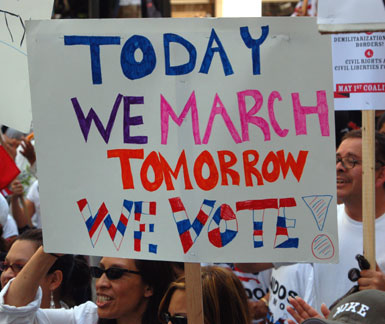
Last night I participated in a "progressive issues focus group," designed to test market a pitch from the Latino-oriented voter registration group, Mi Familia Vota. They didn't make the 10 of us who participated sign any kind of confidentiality agreement, so I am going to tell you all about it.
Participants in my group were all white, though one made a point of his "Hispanic" heritage, middle-aged or older, and ostensibly middle-class. I thought about half of us were gay (they wanted a San Francisco sample, after all.) Afterward, we speculated among ourselves that we had been selected from the mailing/email list of People for the American Way, the sponsor of Mi Familia Vota. They attracted us with a cash payment of $100 for 2 hours.
Warm up questions quickly established that we all identified as minimally "anti-Republicans" and mostly rather more progressive than that. Everyone had done something to try to elect Kerry, usually through the independent "Get Out the Vote" efforts. Many knew folks who had gone to other states to work. I guess we qualified as pretty committed "Bush-haters." I will admit that I didn't leap to explain what I do -- things like political research and organizing to elect candidates -- as I didn't want to take up too much space.
Our ideas about why Democrats are not winning were not very original. Some pointed at the vast sums of money in politics, biased media, conservative think tanks, the religious right. One woman had a very sophisticated analysis of how smart people who vote Republican have to tell themselves lies. I was the only one who mentioned declining union membership and white racial anxieties, though folks nodded when I brought this up.
The researcher conducting the groups then showed us a PowerPoint presentation highlighting the increase in Democratic success in California since the big increase in Latino registration in 1995-96. (Here's when I really muzzled myself, since I have done a lot of research on this for various employers.) People were blown away by a Perot-like presentation of some simple graphs that seemed to show that more Latino voters provided a path toward progressive victory. (They do, but the road will be long and hard getting there -- and Democrats better realize they have pay attention to these newly empowered voters if they want to keep them.)
Apparently, Mi Familia Vota! is moving out of its Florida home and wants to develop a national donor base and win a broader progressive profile. Having been properly awed by the potential of the "Hispanic vote" (the leader's language), we were shown a sample brochure (ho-hum, full of foundation-speak gobble-de-gook), a video (pretty good, though a little slow), and some positive newspaper article quotes (well chosen). We were asked if we might consider giving to the project. Eight of ten said "yes"; the "nos" said they gave elsewhere but liked the project.
They also asked us what method of solicitation we would respond best to -- phone, snail mail or email. Phone bombed; email ruled. This is the part I hope they pay attention to; I love Delete.
 Having been introduced to Mi Familia Vota! naturally I came home and did some quick internet research on the project. They seem to have done a competent job in Florida in 2004, claiming over 50,000 new Latino registrations and 80 percent turnout among them. Two items about their work really struck me:
Having been introduced to Mi Familia Vota! naturally I came home and did some quick internet research on the project. They seem to have done a competent job in Florida in 2004, claiming over 50,000 new Latino registrations and 80 percent turnout among them. Two items about their work really struck me: - Their registration efforts were targeted on the basis of some pretty deep polling. The data gave them a useful profile of who the unregistered Latinos they were seeking might be: 81 percent preferred speaking Spanish over English; 65 percent made less than $40,000 a year, while 57 percent owned their own homes; 68 percent got their news from Spanish language TV; and 96 percent wanted to raise the minimum wage. Many times I've wanted as good data as this to work with instead of guessing at where to send registration volunteers. That Mi Familia Vota! had it in 2004 means they had smart start-up funding.
- They overcame efforts by the Department of Homeland Security to prevent them from registering new citizens at Miami swearing-in ceremonies. Having organized registration at those ceremonies in 1995-96 for Californians for Justice, I know what a struggle that can be with immigration bureaucrats and we didn't have hostile Republicans running the show.
Not surprisingly, I also have some reservations.
First, they are trying to go national. The polling data that supports their work points to one of the problems they face: the Latinos they seek to register are folks who live deep within their immigrant communities. The target population is likely to be most responsive to people who live in their area and share their world. The director of Mi Familia Vota!, Jorge Mursuli, seems to have strong ties in the Miami community, but will the group's projects in other areas be able to claim the same indigenous credibility? Also, in many areas, it is not as if this group would be the only voter registration project; in particular, Southwest Voter Registration has been working to get Latinos into the electorate for many years, with mixed success. Are progressive non-profits duplicating their efforts again, as too many GOTV outfits did in 2004?
Secondly, Mi Familia Vota! is a non-profit. Non-partisan voter registration and civic education are perfectly legal activities for a 501(c) charitable organization; individuals and foundations can legally support them and get tax benefits. That is, there is money in the non-profit tit. But in politics, eventually the rubber hits the road and the project is winning. Progressives don't actually want to register potential Republican voters, just as Republicans trawling fundamentalist churches aren't looking for Democrats. A lot can be done under a non-profit umbrella, but too many progressives want to stay there, safely out of the furnace of competition. Part of why Democrats have been losing is that we have believed we could win simply by being in favor of good government, without fighting. Republicans have proved it isn't so. Staying in the non-profit realm is a temptation to impotence for progressives. We aren't going to win until we know we have to leave our "safe space," at least some of the time.
Friday Cat Blogging

Frisker says: "It's MY absentee ballot!"
You can't have it much long, cat. Later today I will mark it and send it in.
Thursday, May 25, 2006
Another score for another jury
I was surprised. As the AP story pointed out "the Enron case tested the government's ability to prove complicated corporate skullduggery." That can be difficult. Defenses usually try to get juries to focus on the humanity of the executives, rather than the enormous damage their complex machinations can do. Apparently both Lay and Skilling were irritable witnesses, in fact, arrogant jerks.
Guess they blew it."I wanted very, very badly to believe what they were saying, very much so, and there were pieces in the testimony where I felt their character was questioned," juror Wendy Vaughan said after the verdict was announced.

But what fascinated me about the verdict was the picture (above) of the jury. This trial was in Houston. In 2000, Houston was just barely a majority white city -- by now, no single group is a majority. Latinos, the largest non-white group, African Americans and a small Asian population together almost certainly outnumber whites in Houston. Maybe I'm getting a misimpression from the artist's rendering of the jury. But is it really possible that the Enron jury was all white?
Wednesday, May 24, 2006
Immigration ground zero: rights at work
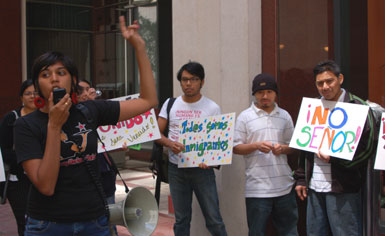
Immigrant rights and labor activists took their struggle to a real "ground zero" of migration policy today in San Francisco. At lunchtime, they picketed Si Senor, a downtown taqueria. One of its workers, Sonia Cano, had filed a claim that she had not been paid the legal minimum wage; soon other workers followed suit. She was then fired after becoming pregnant, and was the victim of an Immigration and Customs Enforcement (ICE) raid that she claims was instigated by her former employers. According to the sponsors of the demonstration, the workers' advocacy center Young Workers United:
Cano gave birth to a son in San Francisco, surrounded by her lawyers and community supporters.Without any investigation into the validity of the tip, ICE raided [Cano]’s apartment when Sonia was nine months pregnant and detained [her partner] Carlos Barrancos for deportation. Sonia was left without income or support for six weeks while her partner was held in a detention center in Eloy, Arizona.
This month Cano not only won her minimum wage complaint but also settled a claim with Si Senor for charges of discrimination, defamation, and retaliation with firing, and sending ICE. Lawyers contacted by the labor activists were able to win voluntary departure without criminal penalty for Carlos and enabled him to see the baby before leaving the U.S.
Today's demonstration aimed to let other downtown immigrant workers know that they can win what they are legally entitled to with the help of workers' organizations.
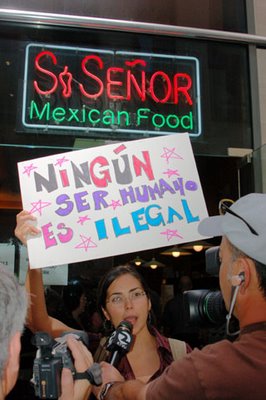
Andrea Mercado of Mujeres Unidas y Activas explained to the press just how commonplace such underpayment and intimidation of immigrants is.
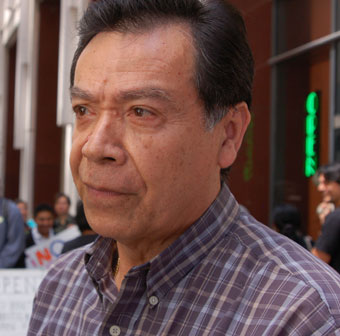
Salvador Guillen refused to say whether he was one of the owners and declined to be interviewed about the case in English, but did defend the taqueria in Spanish, claiming that the "living wage" ordinance was misapplied as Si Senor is really a small business.
Some of the workers have charged that they face insults from the Mexican American owners because the workers are of Mayan ancestry.
Cano has her own conclusions from her experience:
"Don’t remain silent. Stand up for your rights and look for support from the community because we all deserve our rights at work."
Tuesday, May 23, 2006
English as a "national language"
Our current language panic

Last week the Senate displayed its patriotic fervor (and tried to appease anti-immigrant exclusionists) by declaring English our "national language." Well, duh. Perhaps they thought we hadn't noticed what most people speak. After that legislative flourish, they also declared English is the "common unifying language of the United States" but mandated that nothing in that declaration ''shall diminish or expand any existing rights" regarding multilingual services. That is, they tried to make sure their grand gesture did no real damage.
Our Senatorial weasels are walking a historically familiar tightrope. Every time the country has received a large influx of immigrants, those of us already here have tended to panic because the newcomers talk funny. This happened repeatedly in the 19th century as waves of Germans, Italians, and Slavs migrated to the industrial cities that are now the Rust Belt.
In particular, German was a major language in the United States until World War I. According to Mark Goldman's High Hopes: The Rise and Decline of Buffalo, New York, as early as the 1830's German speaking newcomers agitated to get their language taught in the public schools. The English-speaking city fathers rebuffed this agitation until 1866, but then hired German speaking teachers. The German speaking community maintained its cultural distinctiveness until well into the 20th century, finally succumbing to "Americanization" during World War I, ironically under the leadership of a mayor, Charles Fuhrmann, from a German background.
The Buffalo story is representative of most of the country in the same time period. It is hard now to imagine how widespread German language and culture was in this country:
That is, in 1910, roughly ten percent of the population spoke German in the home. And German was simply one among many new immigrant languages. Today we get bent out of shape because many newcomers speak Spanish. Very likely, some of those 19th century German speakers were the ancestors of our current partisans of English as a national language.During the century preceding the First World War, a pluralistic German-language culture existed in America; as late as 1910 an estimated nine million people in the United States still spoke German as their mother tongue. They formed the broad basis for readership of a large variety of German-language newspapers and publications, supplied membership for German-language clubs and parishes, and were the force behind assorted attempts at offering German as a language of instruction, or at least as a foreign language elective, in the public schools.
Source: The German Americans: An Ethnic Experience
As with so many aspects of our current immigration panic, a look at history teaches that we should "get over it!"
Monday, May 22, 2006
Happy Birthday, Harvey
Curb that dog
 Today would have been Harvey Milk's sixty-sixth birthday. Harvey was elected a county supervisor (i.e. councilman) in San Francisco in 1977 and assassinated, along with Mayor George Moscone, after eleven months in office. No one who lived in San Francisco in those years doubts that his killer, a whacked out former cop and supervisor named Dan White, was motivated by a desire to "kill the fag." Harvey is one of the best-known martyrs in the ongoing struggle for full rights for gay and lesbian people.
Today would have been Harvey Milk's sixty-sixth birthday. Harvey was elected a county supervisor (i.e. councilman) in San Francisco in 1977 and assassinated, along with Mayor George Moscone, after eleven months in office. No one who lived in San Francisco in those years doubts that his killer, a whacked out former cop and supervisor named Dan White, was motivated by a desire to "kill the fag." Harvey is one of the best-known martyrs in the ongoing struggle for full rights for gay and lesbian people. At the time of Harvey's election, seeing an openly gay man win political office was mind-bending, unthinkable. He won his seat on his third try for office, after consciously building bridges to unions and the city's various racial and ethnic communities. In office he used the platform his election gave him to urge young gays to come out. He knew he had become a target, recording a typically theatrical will that included the message: "If a bullet should enter my brain, let that bullet destroy every closet door."
Since he was in office only briefly, his legislative record was not overwhelming. According to Time Magazine:
The "pooper scooper" law was in its own way a ground-breaking initiative; at the time, many urban dog owners considered city streets convenient canine toilets. In honor of Harvey's birthday, here are a few signs of what his innovation has wrought.As supervisor, Milk sponsored only two laws -- predictably, one barring anti-gay discrimination, and, less so, a law forcing dog owners to clean pets' messes from sidewalks. He lobbied for the latter with a staged amble through a park that ended with his stepping in it. Editors loved the little item, as Milk knew they would, and he explained the stunt this way: "All over the country, they're reading about me, and the story doesn't center on me being gay. It's just about a gay person who is doing his job."

Straightforward, San Francisco

Carefully correct, San Francisco

Suitable for tourists, Miraflores, Lima, Peru

Municipal and authoritative New York City

Personal and plaintive, San Francisco

Explanatory and emphatic, Austin, TX

Private and cooperative, Upper West Side, New York City
Sunday, May 21, 2006
Four wars and one on the way
What an unbelievable mess we've made of that suffering country.1) The Sunni Arab guerrilla war to expel US troops from the Sunni heartland;
2) The militant Shiite guerrilla war to expel the British from the south;
3) The Sunni-Shiite civil war;
4) The Kurdish war against Arabs and Turkmen in Kirkuk province, and the Arab and Turkmen guerrilla struggle against the encroaching Peshmerga (the Kurdish militia).
In Anthony Shadid's Night Draws Near, he reports that after the U.S. invasion, Iraqis simply couldn't understand how the apparently all powerful United States, which had so easily ended Saddam Hussein's dictatorship, could fail to prevent looting, establish security, and restore some kind of government. They'd seen coups and wars before, but always some authority reestablished itself. And that was three years ago.
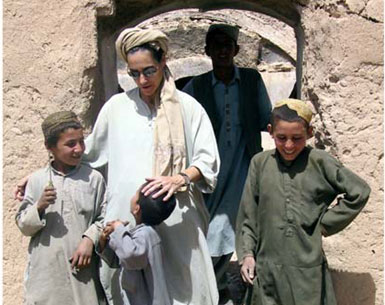
Sarah Chayes in Kandahar, dressed in Afghan's men's clothes, which she has discovered give her the best chance to move about without drawing a crowd, though boys flock to her. Transom Review photo.
Meanwhile, something of the same phenomenon is happening around Kandahar in Afghanistan, according to former NPR correspondent Sarah Chayes who is working for a cooperative business and has lived in the area since 2001. The U.S. refuses to admit that the Taliban is organizing a revolt from neighboring Pakistan and attributes the violence that wracks southern Afghanistan to Al Quaeda. Locals know better but are mystified by official denials. So they have their own explanation:
Read all of Chayes article. Afghanistan is going the way of Iraq, with less media scrutiny.The United States must be in league with the Taliban. They reason that America, with its power and riches, could bring an end to the "insurgency" in a month, if it so chose. They figure that America remains a close and munificent ally of Pakistan, the country that is sponsoring the "insurgency," and so the continuing violence must be a deliberate element of U.S. policy. ... [I]n a stunning irony, much of this city, the Taliban's former stronghold, is disgusted with the Americans not because of their Western culture, but because of their apparent complicity with Islamist extremists.
Impeachment update
The accompanying link looks like just another LA Times link: email.latimes.com/cgi-bin1/DM/y/e23r0IQus50G2B0HYJt0EN Curious, I click on it. You can too.
And here's some of what I see:
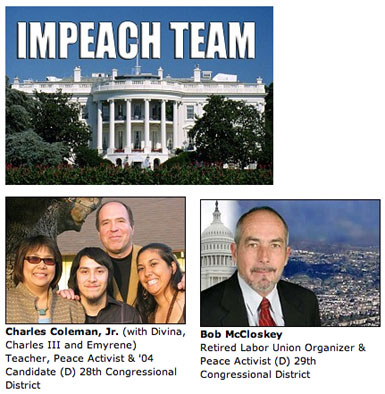
I don't know how these guys got in the LA Times email (guess this is a poorly marked ad), but I do know what I am seeing. As resistance builds against the lawlessness of the Bush regime, little acts of protest are turning up everywhere. These guys aren't going to be in Congress -- McCloskey is taking on incumbent Adam Schiff in a Glendale-Pasadena-Alhambra district that has in recent years become solidly Democratic. Coleman is being a pesky fly in Democratic power Howard Berman's district. But it is sure nice to see these guys making a splash to push their Congresscritters to do the right thing.
See also Freeway Blogger for lots of good ideas for grass roots resistance.
Saturday, May 20, 2006
Seeing ourselves as others see us

The blogger Soj who writes at Flogging the Simian has recently returned to the States from several years living at a modest level of comfort in Romania. Her blog is an interesting window on the world, steeped in her U.S. origins, but also consciously explaining how this country looks to the rest of the world.
In a new post she describes the culture shock she encountered in the freezing aisles of U.S. supermarkets on her return. But then she gets down to the hard stuff, to popular U.S. consciousness of the Iraq war.
We're so rich we don't care; we think we don't have to....this has perhaps become the first war in the history of civilization which has not had any major impact on the country fighting it. I'd say right off hand that the incident of 9/11 has had FAR MORE impact on the life and culture of Americans than the 3 year war in Iraq. It's simply incredibly mindboggling to think that America really is so tremendously wealthy that it can fight a war and barely feel it. What other country could do that? ...
So here I am, in the land of those so rich and powerful they can fight a war on the side, something unthinkable in the history of civilization. And what does that do to the American psyche? What impact does it have on people to know their land is so f--king powerful that it can fight a war and barely feel it?...
It's always been hard for me to understand the fervor of those who want even more war. I'm talking about the neocons and PNACers and those who push for wars with Syria and Iran and whomever else. But I'm starting to see where it comes from. 100 years ago a war the cost of Iraq might not have touched the aristocracy too badly but the peasants would've been eating crusts of bread to pay for it and there's only so much blood you can squeeze out of a turnip. But in America? By god, there's at least two or three more big wars and maybe up to 10 "police actions" that could be started and you still wouldn't even have to ration food....
I also think that explains the apathy so many people have for these wars. I understand the zealotry of those profiting from them, but why the apathy? It's because there's apathy for pretty much anything that doesn't affect you. Do you really give a crap if children in Malawi starve every year? You probably barely even heard of Malawi and unless you see some commercial at 2am, it doesn't even enter your consciousness. And neither does the Iraq war.
Friday, May 19, 2006
Night Draws Near:
Iraq's People in the Shadow of America's War
 Anthony Shadid's reporting from Iraq for the Washington Post first grabbed my attention in early June, 2003. This was at the beginning of the U.S. occupation under proconsul Paul Bremer. Shadid, an Arabic speaking, Oklahoma-born, Lebanese-American, had lived through the invasion and the subsequent looting in Bagdhad, sharing fears and hardships with many Iraqis.
Anthony Shadid's reporting from Iraq for the Washington Post first grabbed my attention in early June, 2003. This was at the beginning of the U.S. occupation under proconsul Paul Bremer. Shadid, an Arabic speaking, Oklahoma-born, Lebanese-American, had lived through the invasion and the subsequent looting in Bagdhad, sharing fears and hardships with many Iraqis. Upon the arrival of his Post colleagues, Shadid and Thomas Ricks were able to conduct a telling experiment. Ricks accompanied a group of U.S. soldiers on patrol; Shadid followed the squad, gathering the impressions of Iraqis about their interactions. Where a G.I. saw the Iraqis as "ninety five percent friendly," Shadid heard the occupation was "despicable....They're walking over my heart." The U.S. soldiers were particularly proud of their assistance to the Rami Institute for Autistic and Slow Learners, enjoying leaving their guns in the school yard while they played with the children. They had no idea, as Shadid reported, that the young Iraqi men clustered outside suspected that the soldiers might be having sex with the women teachers: "Only God knows ... I haven't seen it with my own eyes. But I've heard about things."
Night Draws Near collects Shadid's reporting on the gulf between invaders and Iraqis that has played out in repeated episodes of bloody devastation and human desolation. He arrived in Iraq while Saddam Hussein was still in power and wraps up the book with his observation of the January, 2005 election of purple thumbs. In between he made friends and, with the help of his Iraqi "fixer," conducted searingly honest interviews with many who came to hate and fear the occupation. Because he so obviously likes and cares about many Iraqis, he tries to find a hopeful note to end on, but the overall impression he conveys is of bewilderment striving to hold off despair.
As a U.S. activist who has followed the course of the invasion and occupation quite closely, I was struck by how Shadid, reporting from Iraq, reports a quite different understanding of the phases of this sorry story. At the beginning, the picture from my U.S. point of view was in sync with that of the Iraqis -- shock and awe bombing, then invasion, the toppling of the Saddam statue (which I always thought of as a vignette made for TV) followed by terrible looting and insecurity.
But soon our pictures diverge. In Iraq, the summer of 2003 seems to have been about the Shiites exuberantly claiming power commensurate with their numbers and the rise of the young cleric Muqtada Sadr. From the U.S., the picture was dominated by the failure to turn up any WMDs and by the surprising durability of a Sunni-led insurgency that blew up the U.N. humanitarian mission. We could only dimly understand that for Iraqis the U.S. presence was rapidly hardening into a humiliating occupation, on a par with that suffered by the Palestinians.
As Shadid reports it, the next phase as seen by Iraqis began with coordinated bombings that killed scores in Bagdhad on the first day of Ramadan, October 27, 2003.
In the U.S., I don't particularly remember this turning point, though I know many of us thought the Administration was lying to us daily when claiming "progress."[T]he conversations would never be the same again, and the perception of the American military in Iraq was taking yet another turn; the all powerful army imbued with technological prowess has become, first a callous overseer in a looted capital, then an insensitive occupier in a Muslim land, and now, in the wake of the Ramadan bombings, it was a provocative presence whose visibility only deepened the strife....Dread was everywhere.
In December 2003, when Saddam Hussein was captured, the U.S. Administration worked to spin the event, especially on its deluded homefront, as evidence of further "progress." According to Shadid,
A radicalized Islam was filling the power vacuum left by Saddam's overthrow. In Sunni areas, racial clerics celebrated martyrdom in the fight against the U.S. invaders. Among Shiites, traditionalists followed Ayatollah Sistani who urged deliberate steps toward restoring Iraqi governance under Shiite leadership; younger and poorer Shiites were drawn to young Sadr who called on them to expel the occupiers.Saddam soon became a sideshow in Iraq. The stakes were higher: Who has the right to rule and from where does that right arise?

Shadid reports from Najaf near the Imam Ali shrine, one of Shi'a Islam's most venerated sites.
Shadid dates the next phase in Iraq as beginning with suicide bombings on March 2, 2004 in the Shiite cities of Najaf and Karbala. More than most anywhere in Iraq, the shrine cities had prospered from the overthrow of Hussein, filling with pilgrims finally able to worship at the shrines. When they too were bathed in blood as Baghdad and the Sunni triangle had long been, in the eyes of Iraqis the occupation had irretrievably proved that it would not or could not rule. It was over, even if Paul Bremer in the Green Zone and George W. in Washington hadn't noticed yet. Uprisings by Sadr's Mahdi Army in the south and the capital and by militant Sunnis in Fallujah followed.
For U.S. observers of the occupation, the spring 2004 uprisings were not exactly a shock, but their scope and the short term successes certainly were impressive. From our great distance, it took a long time for people to believe that Iraq was not under U.S. control, but that spring this impossible truth began to seem real. John Kerry had already emerged as the Democratic nominee for President; his popular base was rapidly realizing that the U.S. adventure in Iraq was a failure, just as Kerry let himself to be trapped into trying to explain how he'd do occupation better than Bush. The Iraqis were residents of a grimmer reality, spiraling into an inter-communal power struggle; the occupiers thought they were steering the ship but actually were simply trying to navigate impossible rapids while lumbering about with lethal weaponry.
Shadid's story ends in 2004 (with a short epilogue about the 2005 election.) As just about anyone reading this knows, Iraq has simply become bloodier and more chaotic since. For a current accounts of life in Iraq's capital, try Treasure of Baghdad; if you are like me, you'll weep.
There was one more insight from Night Draws Near that I wanted to mention. Shadid writes:
On the one hand, this observation can seem to emphasize the distance between our U.S. culture and the Arab world. But a very little reflection reminds me that the passion for justice is also one of the pillars of our culture, from the Psalmists of the Hebrew Scripture crying out to God for the weak through Martin Luther King Jr. preaching that tradition to a white supremacist society in the last century. The recent immigrant marches were rooted in the same tradition. We in the U.S. who want to curb the empire should be able to recognize the cry for justice arising from the Arab world. Pope John Paul II famously said there can be "no peace without justice." There also can be no meaningful freedom where injustice reigns.Time and time again I am struck by how seldom I hear the work hurriya, "freedom," in conversations about politics in the Arab world....Much more common among Arabs is the word adil, "justice," a concept that frames attitudes from Israel to Iraq. For those who feel they are always on the losing end, the idea of justice may assume supreme importance.
Thursday, May 18, 2006
Cast a vote for our future
 You can help pick the winners of a contest that will give California students scholarship money for college. Before 11am PDT, May 21, visit the contest page of the Campaign for College Opportunity. There you can read finalist essays by middle and high school kids and view the posters and TV ads they've created on the theme "Save a Spot for Me in College." Take a look and cast your vote for the overall winners.
You can help pick the winners of a contest that will give California students scholarship money for college. Before 11am PDT, May 21, visit the contest page of the Campaign for College Opportunity. There you can read finalist essays by middle and high school kids and view the posters and TV ads they've created on the theme "Save a Spot for Me in College." Take a look and cast your vote for the overall winners.Do this and you'll be participating in an innovative grassroots lobbying effort. The Campaign for College Opportunity seeks to impress on state legislators the need to support community college education for all students who graduate from high school. The state master plan has called for such support for many years; the state's higher education system has been much of the engine of California's prosperity. But state government has been hamstrung by the refusal of Republicans to agree to any new tax measures, and consequently, community colleges have begun to crack under demand that exceeds the supply of places. They have raised fees, limited the availability of classes, and cannot provide the counselors who might help get students through the bureaucratic maze.
So the Campaign wanted to collect California students' own thoughts and dreams about college to share them with legislators. What better way than a contest with real money prizes?
Last month I wrote about serving as a reader in the first phase of the contest. It was a fascinating experience. Hundreds of us helped winnow down 8000 entries.
Now the Campaign seeks our online votes which will be used alongside those of a panel of judges who include:
Reading these student essays, what came through so poignantly is that these young people, many of them immigrants or children of immigrants, want to be what they think of as "good people" -- productive workers, supports to their parents, participants in their community. Read their own words at the contest page and help give them a leg up toward their dreams.
- Farai Chideya, author and correspondent for National Public Radio
- Don Hahn, Interim Head of Feature Animation at the Walt Disney Company
- Joe Kapp, former NFL star
- Josefa Salinas, radio personality for Hot 92 Jamz in Los Angeles
- Peter Schrag, columnist for the Sacramento Bee
- Mike Sklut, host of "High School Sports Focus" on Action 36 in the Bay Area
Wednesday, May 17, 2006
Our impossible beliefs had better be novel

AT ST. PETER’S SQUARE: A tourist bus covered with an advertisement for “The Da Vinci Code” movie is parked at the Vatican, where a debate is raging over the blockbuster novel. (Alberto Pizzoli AFP/Getty Images) Via LA Times
"We're not a secular society, we're a credulous one," according to Frederick Forsyth, author of best-selling thrillers including The Day of the Jackal, when discussing Dan Brown's book on BBC radio.
It seems to me that Forsyth has more accurately described the atmospherics around the novel and the new movie than any number of fulminating preachers who denounce it.
The entirely skeptical Adam Gopnik also did quite a job on this phenomenon in a New Yorker review:
We live in a culture at once hungry for belief and very unsatisfied by what's on offer.A cultural anthropologist, a hundred years from now, will doubtless find, in the unprecedented success of “The Da Vinci Code” during the time of a supposed religious revival, some clear sign that, in the Elvis mode, what a lot of Americans mean by spirituality is simply an immense openness to occult superstitions of all kinds.
Most of the discussion of the film simply exemplifies our lack of practice at thinking about our culture's conventional faith stories. Tracy Wilkinson, in a generally thoughtful effort to discuss the film's impact on the Roman Catholic hierarchy, claims that Dan Brown's premise that "Jesus married Mary Magdalene and had a child [is] an idea that challenges the divinity of Christ...." Huh? The guy was a Jewish peasant carpenter. That he should have been married and fathered a child seems completely plausible; it might not have seemed worth mentioning to his contemporaries. The "orthodox," wildly implausible idea that Jesus was both God and man is both less and more believable than the suggestion he had a family life.
We, the citizens of this vastly rich, unthinkably powerful, early 21st century empire, don't much like the stories of our own lives. Living in a shallow commercial culture surrounded by lies, we want new and better stories. The ancient content of Christian faith -- that God mysteriously became a human being, died, and appeared alive again -- is both unbelievable and too familiar to be interesting. We want this year's story, a shining new one. Curiously, our standards of proof are no higher for the new one than for the old one: neither seems plausible in the light of contemporary notions of material reality -- but novelty automatically improves on antiquity for many people. So here comes The Da Vinci Code. None of this is any reason to forego a good yarn. And none of it has much to do with the lived experience of looking for God in the Christian story.
Monday, May 15, 2006
Nice little bonus from the immigration panic

Well Bush gave his immigration speech and I didn't listen to it, because the man makes me ill on direct exposure. Don't miss CNN's broadcast of his rehearsal at Crooks and Liars though, if you can get the page to load.
However I did notice this smidgen in the NY Times transcript:
So what follows from this? Some musings:"A key part of [the temporary worker] system should be a new identification card for every legal foreign worker. This card should use biometric technology, such as digital fingerprints, to make it tamper-proof. A tamper-proof card would help us enforce the law ..."
So you want a job? Show me your card.
You are brown and you don't have one -- we'll have to deport you.
Oh, you say you are a citizen? Well, then everyone better have a card.
See, those brown people, they made you all get identity cards.
Well, yes, those ID cards fit well in the latest NSA, 24/7, all-seeing seamless surveillance culture.. You want us to protect you from brown people and terrorists, don't you? Don't you?
Hey, buddy, you know we'll take care of you....
At Medicare Part D deadline,
seniors say "Replace the program!"

To show the large volume of petitions they had collected, protesters spread the individual sheets out on large red banners.
Speakers denounced Medicare Part D (the partial prescription drug benefit) outside the San Francisco Federal Building this afternoon, bringing petitions with 20,000 signatures to give to Congresswoman Nancy Pelosi.
Today was the last day for current Medicare recipients to sign up without penalty; those failing to do so will be charged a late enrollment assessment for life! Once the sign up deadline is past, eligible people who didn't manage to figure it out will not be able to enroll until January 2007 and will pay what some are calling Bush's "prescription drug tax," a seven percent penalty.

Demonstrators listened patiently.
Many seniors have found the new "drug benefit," provided by a confusing array of private insurance companies, fails to cover their particular needs or, even worse, isn't honored by their pharmacies.
According to speakers at today's rally, the Republican-backed new law is designed to raise profits of insurance companies, not to ensure the well-being of older people who need drugs. It is full of bureaucratic hurdles, inflexible rules and coverage gaps that almost seemed intended to trip up "beneficiaries."
Pelosi knows when she has to get on the bus with her constituents. Her aides passed out a statement:
While the benefit works for pharmaceutical companies and big business HMOs, it isn't doing enough to make prescription drugs more affordable for our seniors. That's why Democrats are working to improve the flawed Republican prescription drug program -- and we want to do it today.
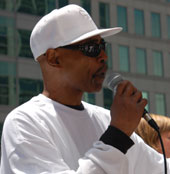
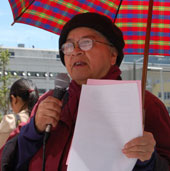
Bobby Bogan (left above), an organizer for Seniors Organizing Seniors, would go a lot farther than our Congresscritter. He announced: "if we have to, we'll sit in, walk in, roll our wheel chairs in and get this unfair law replaced."
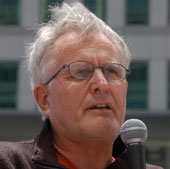

Don Beckler (left) of Health Care for All called the Medicare Part D program nothing but "snake oil from insurance companies" and called for universal, single-payer health care. Don Beetle (right) testified to what it is like living with a Medicare eligible roommate with HIV disease whose drugs simply aren't comprehensively, reliably covered under this program.
The small demonstration was also organized by the California Alliance of Retired Americans, Gray Panthers, and Senior Action Network.
According to the New York Times, chaotic federal implementation of the plan has forced many states to step in to pay charges their senior citizens cannot put out while waiting for the Feds to get organized.
According to the San Francisco Chronicle, there are 43 million people on Medicare. Republicans expect 6 million to miss the deadline; Democrats think that figure will be more like 9 million.In January, California, like many other states, set up an emergency program to help low-income people having difficulties filling prescriptions under the new Medicare law. Stan Rosenstein, the Medicaid director in California, said last week, "We are spending a half-million dollars a day on our program because a number of people are still having problems."
The California program is set to expire on Tuesday. The Legislature is working with Gov. Arnold Schwarzenegger to extend it, with some changes, through Jan. 31.
Protesters don't really care what either set thinks: they want their government to do its job and ensure that older people get the benefits their wealthy country should be able to provide them.
Sunday, May 14, 2006
Big Brother and all that

Michael Cline photo
So the National Security Agency is collecting all our phone records -- and has been for years. This is, of course, yet another instance of a casual, probably illegal, violation of our expectation of personal privacy by our current rulers. The Bushies are authoritarian megalomaniacs bent on undermining any constraints of law. Our Constitutional framework may not survive the present lot.
But that is not what I want to look at. What I want to focus on is that the technical means now exist to know just about everything about all of us. If we use any of the everyday conveniences of modern life, we leave trails -- on the phones, on the internet, from the transponders that pay bridge tolls, with our credit card and debit card purchases, even at the supermarket with our "club" cards. Our lives are totally open books; most of this data is for sale to corporations that want to sell us things. And with enough computing power, certainly available to governments and probably to the largest corporations, there is very little about our lived lives that can't be known based on the electronic trails we create.
As I've explored before,what's new is simply the amount of personal information that can reasonably be collected and digested. Our past expectations of privacy, of anonymity, depended on the inability of anyone to know so much about us. Now we give away vast amounts of data to interested parties everyday.
Most of us know this, intuitively. William Gibson, the dystopian author best known for the novel Neuromancer, had some interesting observations on some reactions to news of the NSA spying:
Exactly. The problem of privacy, of any meaningful freedom for individuals, in an environment of technical transparency is entirely a problem of political creativity. As attorney Kevin Bankston of the Electronic Frontier Foundation explained to the LA Times:I've been watching with keen interest since the first NSA scandal: I've noticed on the Internet that there aren't many people really shocked by this. Our popular culture, our dirt-ball street culture teaches us from childhood that the CIA is listening to *all* of our telephone calls and reading *all* of our email anyway.
I keep seeing that in the lower discourse of the Internet, people saying, "Oh, they're doing it anyway." In some way our culture believes that, and it's a real problem, because evidently they haven't been doing it anyway, and now that they've started, we really need to pay attention and muster some kind of viable political response. ...
In the very long view, this will turn out to be about how we deal with the technological situation we find ourselves in now. We've gotten somewhere we've never been before.
Via Boing Boing
Our Bill of Rights and our system of laws assumed that Big Brother's reach would have practical limits. That is no longer true."There is simply no legal process for this kind of wholesale invasion of privacy. What they claim to be doing with the data is irrelevant because the fact is they could do whatever they choose without any oversight."
Today we are challenged to develop new restraints on governments to meet the new conditions. The enormity of the task is only slightly reduced by appreciating that overthrowing of the divine right of kings probably seemed only marginally less daunting in the mid-1700s. We might pull it off; the species has before, at some times and in some places. The cost of constraining monarchs has never been small; the project is not likely to be quick or easy this time either.
Saturday, May 13, 2006
Watching the Prez to nail his pelt to the wall
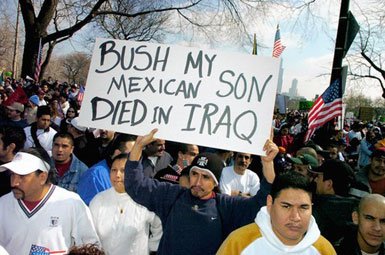
Apparently Bush intends to "secure the border" using the National Guard. That's expected to be part of his Monday speech. Huh?
- What National Guard? Didn't they use up that pool of cannon fodder in Iraq?
- Don't they know who joins the Guard: enterprising young people seeking a way up. Wonder how many are Latino?
- Apparently Bush wants to make himself into Pete Wilson. This move may serve him in this year's elections, but the Republicans can forget the Latino vote, especially after some National Guardsman shoots some unfortunate U.S. citizen who happens to be brown.
Friday, May 12, 2006
Now a cheer for ONE juror
 So one lone juror kept the United States from the ignominy of executing a lunatic, convicted on the basis of torture evidence under a crackpot theory of responsibility. The foreperson (unidentified but evidently female) of the Moussaoui jury reports she was frustrated that despite 11-1, 10-2 and 10-2 ballots, no one would argue against the death penalty, yet someone kept voting it down.
So one lone juror kept the United States from the ignominy of executing a lunatic, convicted on the basis of torture evidence under a crackpot theory of responsibility. The foreperson (unidentified but evidently female) of the Moussaoui jury reports she was frustrated that despite 11-1, 10-2 and 10-2 ballots, no one would argue against the death penalty, yet someone kept voting it down. The jury had to reach unanimity in order to smoke the guy.But no one could figure out who was casting the dissenting vote, the foreman said, because that person didn't identify himself during any discussion -- and each of the votes were done using anonymous ballots.
Yet another instance when sanity seems to hang by a thread.
Thursday, May 11, 2006
Go to jail; graduate from high school

A Palestinian girl holds a sign that reads in Arabic "salaries" during a demonstration by school teachers calling for payment of their salaries in the West Bank city of Nablus May 10, 2006. REUTERS/ABED OMAR QUSINI.
This story is a jaw dropper. Young Palestinian men are trying to get themselves arrested at Israeli checkpoints in order to be sent to prison where they can more easily study for exams than in the starving occupied West Bank, according to Reuters.
This story smells like somebody's disinformation campaign, but I have no way to know if it is true. If it is true, it speaks to a horrendous level of despair in occupied Palestine. Not surprising, given the US and European cut off of aid to Palestine in reaction to the election of the Hamas government. As of yesterday, apparently some assistance will resume, now that Israel's allies have shown who is boss.Israeli army officials say at least 80 young men have either turned up at checkpoints and asked to be arrested or else carried knives and other weapons to ensure they are detained. ...
Hijazi Abdul-Rahman, 18, who lives in a village near Jenin, in the northern West Bank, went to a nearby checkpoint with his friend Malik a month ago in an attempt to be arrested. Abdul-Rahman carried a small knife and Malik, who would not give his family name, openly carried a badly wired bomb.
They were detained by Israeli security forces and sent to a holding cell but released 25 days later after it emerged under interrogation that they were not a serious security threat. For Abdul-Rahman it was a grave disappointment.
"I lost my chance," he said, speaking at his home in a village north of Jenin. "I wanted to do my high school exams in prison because it is easier there than at school here." ...
"It's better to spend even your whole life in prison than to be stuck here," he said. "Here we can't even have a sandwich."
Wednesday, May 10, 2006
Remembering homeless mothers
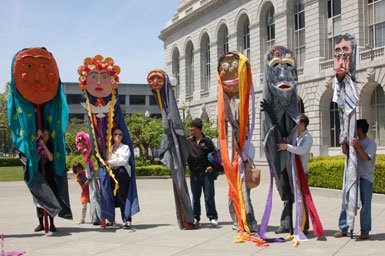
We may think that Mothers Day comes along on Sunday, but it is celebrated on May 10 in much of South America, Mexico, India, Pakistan and the Arabian Peninsula. So here in San Francisco, homeless advocates and students from Graduate Theological Union held a procession and speak out for homeless mothers, especially victims of wars, in the War Memorial Veterans Building Garden in Civic Center. The event was dominated by huge plaster puppet "saints" made by students in a class taught by Sally Hindman of the Center for Arts, Religion and Education. The activist San Francisco Coalition on Homelessness and senior artists from West Oakland's St. Mary's Center helped organize the small demonstration and prayer service.
The event was a small but very San Francisco-like mixed bag in the noonday sun.
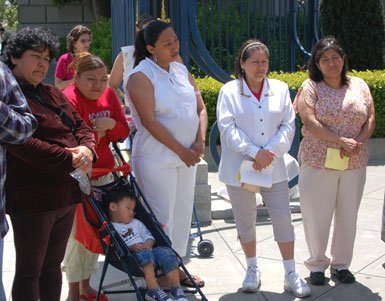
Spanish speaking mothers looked on.


A brother from the Coalition offered prayer and Fr. Louis Vitale spoke out for justice.
Homeless mothers certainly need any attention they can get. It is surprisingly difficult to find a quantitative description of homelessness among mothers or, actually, anybody. According to the U.S. Census Bureau FAQ
If you dig very deeply into their data, in 2000, you find a category of persons living in "Other noninstitutionalized group quarters" who may be homeless; of these 1.3 million people, about 46 percent are female. Who knows how many are homeless? Who knows how many are mothers? Who knows how many the census missed?Question: Does the U.S. Census Bureau have information on the population experiencing homelessness?
Answer: The U.S. Census Bureau does not produce counts of the population experiencing homelessness.
Our social scientists also don't seem to know much about homeless mothers. Or, more likely, government institutions that fund social science research won't fund efforts to find out who is on the street in the era of "welfare reform." One of the better studies was completed in 1996, before cutbacks to the aid programs that held these families together. The Worcester Family Research Project (available as a .pdf) provides a glimpse of who homeless mothers are. They are likely to be:
- Extremely impoverished. In 1996, "homeless mothers reported a mean annual income of $7910 a year, 67% of the federal poverty level for a family of three. About half lived on less than $7000 a year."
- Subject to residential instability. "Homeless families moved nearly four times in the two years prior to becoming homeless... Eighty-nine percent of the homeless moved in with family or friends in the two years prior to becoming homeless."
- Socially isolated. Homeless "mothers ...had few relationships they could count on for financial and emotional support."
- Victims of severe physical and/or sexual abuse and assault. "A staggering 92% of the homeless ... experienced severe physical and/or sexual assaults at some point in their lives. More than 40% ... were sexually molested as children."
- Sickly. "Nearly one-third of homeless ...women reported a current chronic health condition, with high rates of asthma, anemia, and ulcers. This is especially disturbing since the average age of the mothers was 27 years."

